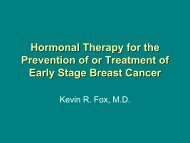GASTRIC CANCER Risk Factors And Pathology
GASTRIC CANCER Risk Factors And Pathology
GASTRIC CANCER Risk Factors And Pathology
Create successful ePaper yourself
Turn your PDF publications into a flip-book with our unique Google optimized e-Paper software.
<strong>GASTRIC</strong> <strong>CANCER</strong><br />
<strong>Risk</strong> <strong>Factors</strong> and <strong>Pathology</strong><br />
Antonia R. Sepulveda M.D., Ph.D.<br />
Department of <strong>Pathology</strong> and Laboratory Medicine<br />
University of Pennsylvania, Philadelphia, PA<br />
asepu@mail.med.upenn.edu
STOMACH TUMORS<br />
–Carcinoma<br />
– Lymphoma (MALT; other)<br />
– Gastrointestinal stromal tumors<br />
(GIST)<br />
– Leiomyoma; Leiomyosarcoma<br />
– Carcinoid tumors
Gastric Cancer<br />
LOCATION<br />
Cardia<br />
Fundus<br />
Body<br />
H. J. Stein, M. Feith and J. R. Siewert<br />
Surgical Oncology, 9, (1) 35-41; 2000<br />
Antrum<br />
Pylorus
Stomach (Gastric) Cancer<br />
• Overall 14th in incidence among the major<br />
types of cancer in the US<br />
• Worldwide, gastric cancer is the fourth most<br />
common cancer<br />
• Estimated new cases from stomach cancer in<br />
the United States in 2008:<br />
– New cases: 21,500
Stomach (Gastric) Cancer<br />
• Age: Most people with this disease are 72 or older<br />
(in the US).<br />
• Sex: Men are more likely than women to develop<br />
stomach cancer.<br />
• Race: more common in Asian, Pacific Islander,<br />
Hispanic, and African Americans than in non-<br />
Hispanic white Americans.<br />
• Conditions with increased risk of stomach cancer:<br />
– Stomach surgery<br />
– Chronic gastritis:<br />
• Helicobacter pylori<br />
• Autoimmune gastritis-Pernicious anemia
Role of <strong>Pathology</strong> and Pathologists in<br />
evaluation of patients for gastric cancer<br />
• Diagnosis: in biopsy<br />
sample or surgically<br />
resected stomach<br />
• Determine tumor stage<br />
• Precursor lesions<br />
Intestinal metaplasia-><br />
dysplasia<br />
• Important for selection<br />
of treatment<br />
• Important for<br />
surveillance &<br />
prevention<br />
• Contributing risk factors<br />
or underlying cause<br />
– H. pylori gastritis<br />
– Genetic predisposition<br />
(hereditary gastric cancer)<br />
• Important for<br />
prevention of cancer
Pathologic Types of Gastric Carcinoma<br />
-Adenocarcinoma<br />
Well or Moderately<br />
Poorly Differentiated<br />
Differentiated<br />
Signet ring cell<br />
Intestinal type<br />
Diffuse
Signet Ring Cell Carcinoma:<br />
Sporadic type or hereditary gastric cancer
Chronic<br />
H. pylori<br />
infection<br />
Carcinogens<br />
Smoking<br />
Hereditary<br />
E. cadherin<br />
Mutation<br />
Gastric<br />
Cancer<br />
<strong>Risk</strong> factors<br />
Hereditary<br />
HNPCC<br />
FAP<br />
Genetic<br />
susceptibility<br />
Salt<br />
Nitrosamines<br />
Low<br />
Vitamin C
Facts:<br />
-H. pylori infects 50% of the world population<br />
-30–40% of the U.S. population is infected with<br />
H. pylori
Helicobacter pylori Gastritis and<br />
H. pylori<br />
infection<br />
Gastric Cancer<br />
Chronic<br />
Gastritis<br />
Atrophy &<br />
Intestinal<br />
Metaplasia<br />
Decades...<br />
Dysplasia<br />
Adenoma<br />
Carcinoma
Gastric Intestinal Metaplasia<br />
and Surveillance<br />
• Extensive Atrophic gastritis and intestinal<br />
metaplasia:<br />
– 10 year surveillance 8.4% developed gastric cancer<br />
– Recommend annual surveillance<br />
-Whiting et al. Gut 2003;50:378-81
Treating H. pylori gastritis before and<br />
after diagnosis of gastric cancer<br />
• H. pylori gastritis is treated with antibiotics<br />
• H. pylori eradication reduced the incidence of gastric<br />
cancer in patients without atrophy or IM, suggesting<br />
that eradication may contribute to preventing<br />
progression to gastric cancer<br />
– Wong et al. JAMA 291, 187-94, 2004<br />
• Recent studies recommend prophylactic H. pylori<br />
eradication after resection of early gastric cancer to<br />
reduce the risk of carcinoma in the remnant stomach<br />
Fukase et al. Japan Gast Study Group Lancet 372: 392–97, 2008
Familial Diffuse Gastric Cancer<br />
• Associated with germline mutations in the E-<br />
cadherin gene<br />
– Genetic testing in blood DNA<br />
• Autosomal dominant: Gastric cancer develops<br />
in 3 of every four carriers of this mutation at<br />
young age-often multifocal<br />
• Genetic testing and consideration of<br />
prophylactic gastrectomy recommended<br />
• <strong>Pathology</strong>: diagnosis of characteristic signet<br />
ring cell carcinomas.


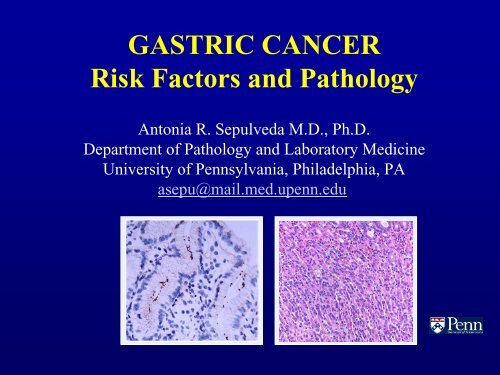

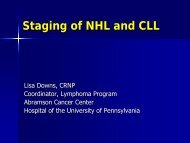
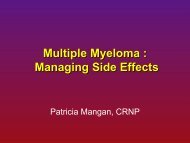
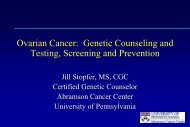
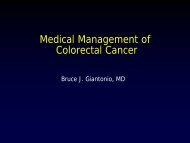
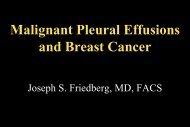

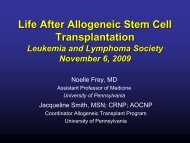



![Agenda [PDF] - Abramson Cancer Center](https://img.yumpu.com/35341208/1/190x245/agenda-pdf-abramson-cancer-center.jpg?quality=85)
